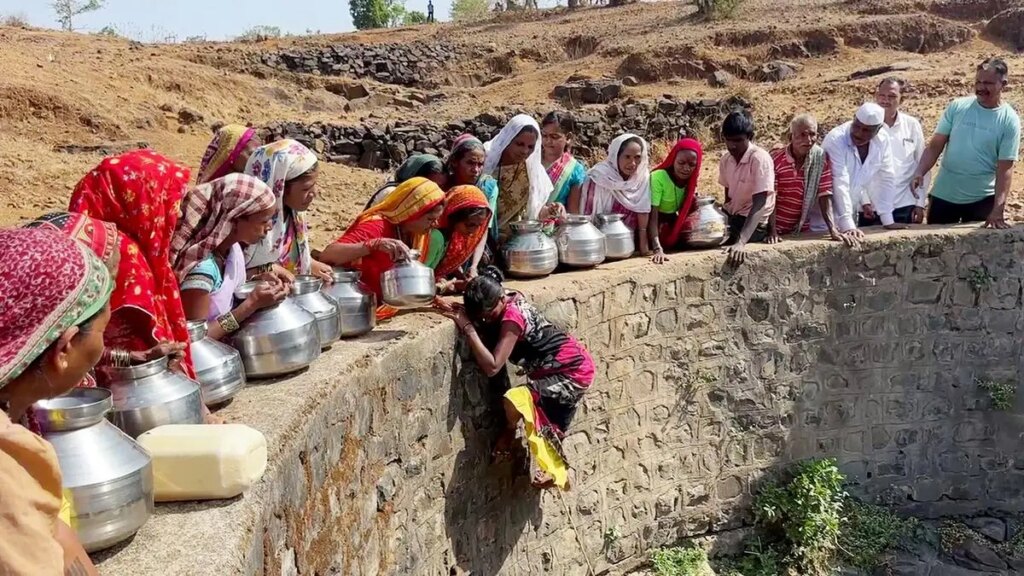A video of a woman climbing down into a well in Maharashtra went viral on April 20, 2025. She was supported by several other women standing along the well’s wall. The video, from Borichi Bari village in Peth tehsil of Nashik district, showed women from the tribal community struggling to access water. Although Nashik is considered a comparatively developed district, the scene brought renewed attention to the severe water scarcity affecting parts of Maharashtra. Until recently, headlines from the State were dominated by news of communal tensions and political strife. But as the Borichi Bari video spread across social media, public outrage grew over the political leadership’s priorities.
As temperatures soar this summer, Maharashtra faces an acute drinking water crisis. Despite receiving 107 per cent of the average monsoon rainfall last year, just 41 per cent of water stock remains in the State’s dams. Water cuts have become routine across almost every region, exposing both the failures of Maharashtra’s irrigation system and the hollow claims of success under the Jal Jeevan Mission.
According to documents accessed by Frontline, by April 25, all of Maharashtra’s divisions reported dam water levels below 50 per cent: Konkan (44.37 per cent), Nagpur (37.55 per cent), Amaravati (45.99 per cent), Marathwada (35.82 per cent), Nashik (40 per cent), and Pune division the lowest at 30 per cent. Cities across the State are seeing water supplied only once every 10 days or more. Ausa in Latur gets piped water once every 12 days, Manmad in Nashik once every 13 days, and even Pimpri-Chinchwad faces six-day intervals. In Maharashtra Industrial Development Corporation (MIDC) areas across Thane, Nashik, Pune, Kolhapur, Dhule, and Chhatrapati Sambhajinagar districts, residents receive water just twice a week.
Field information collected by the Water Supply Department and accessed by Frontline paints a grim picture: Nashik and Jalgaon districts are supplying water via tankers to 64 villages and 138 settlements (bastis). In Marathwada, 200 water tankers were deployed as of April 20, with an estimated 700 villages expected to require tanker supply by May 5. In Konkan, nearly 600 villages have started receiving water by tankers.
Also Read | A saga of drought, debt, and deaths in Maharashtra
The Pune division reports severe scarcity, with around 1,000 villages depending on tanker supplies. Even Pune city alone has mobilised 3,154 municipal tankers and relies on 39,662 private tankers.
As the scale of the water crisis becomes clear, serious questions are being raised about Maharashtra’s water management and the implementation of the Jal Jeevan Mission.
Corruption and recurring crisis
Eleven years ago, the Bharatiya Janata Party (BJP) came to power in the State campaigning against alleged corruption in the irrigation sector, branding it the “Rs.70,000 crore irrigation scam”. The then BJP State chief Devendra Fadnavis led accusations against the then Deputy Chief Minister Ajit Pawar. Today, Fadnavis is the Deputy Chief Minister and shares power with Pawar, now his political partner. Meanwhile, discussion of the irrigation scam has faded—and yet, despite the BJP being in power for 8.5 of the past 11 years, little has improved on the ground. The recurring drinking water crisis shows that the State’s water storage and management capacities remain woefully inadequate.
Pradeep Purandare, a retired Associate Professor at the Water and Land Management Institute (WALMI) and a prominent voice against the irrigation scam in 2014, told Frontline: “Maharashtra’s water table is depleting rapidly. All projects—whether micro-irrigation or large-scale—are contractor-driven, not people-centric. Genuine water conservation efforts are undertaken more by NGOs and private bodies than by the government.”
At the same time, this summer’s crisis also exposes glaring failures in the much-touted Jal Jeevan Mission. Cleared in 2021, the State sanctioned 40,000 water supply schemes under the Mission at a combined cost of Rs.21,813 crore. However, only 33,651 schemes—about 66 per cent—have had work orders issued. According to an internal report accessed by Frontline, multiple issues have stalled completion: Many settlements were missed during the planning stage. Several water sources identified for schemes have dried up. Many Gram Panchayats passed resolutions for the projects but failed to provide land for tanks or water treatment plants, and frequent redesigns were required owing to relocation of infrastructure sites.
With large parts of the State parched, the opposition has stepped up its attack. The Congress has reportedly instructed all its MPs and MLAs to conduct a “fact-check mission” starting May 2, visiting villages where Jal Jeevan Mission work is claimed to be completed. “Our leaders will verify whether the schemes are operational or only exist on paper,” said Congress State chief Harshwardhan Sapkal.
Veteran Marathwada-based social activist and petitioner against the Jal Yukta Shivar scheme, Professor H.M. Desarada, added: “An investigation into the Jal Jeevan Mission is necessary. Thousands of schemes have been granted work orders without adequate funding from the Centre. Contractors abandoned projects halfway, and on paper, the government claims they are still ‘in progress.’”
Also Read | Maharashtra’s multidimensional poverty trap
Even within the ruling coalition, there have been allegations of corruption. During the last monsoon session of the Maharashtra Assembly, BJP MLAs Nitesh Rane and Dadarao Keche, and NCP (Ajit Pawar faction) MLAs Sunil Shelke and Ashutosh Kale raised concerns about irregularities in the Jal Jeevan Mission. Then Water Supply Minister Gulabrao Patil promised a third-party audit of the schemes. Frontline has learned that the audit report was submitted but remains unpublished.
“From poor-quality pipes to inflated bills for taps, many irregularities have been flagged. That’s why the report has not been made public yet,” a senior Water Supply Department official told Frontline.
With natural water sources drying up and thousands of villages expected to rely on tanker supplies by May 10, pressure is mounting to release the audit findings. Each summer brings renewed scenes of women struggling for a single pot of water. The crisis of 2025 must finally force accountability for the thousands of crores spent—at least in the name of ending their misery.
Source:https://frontline.thehindu.com/the-nation/maharashtra-water-crisis-drought-jal-jeevan-mission-failures-bjp-government/article69501578.ece

